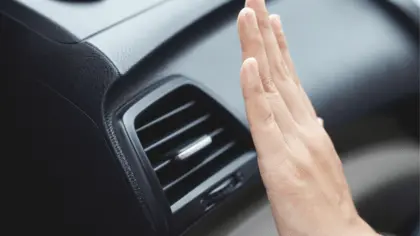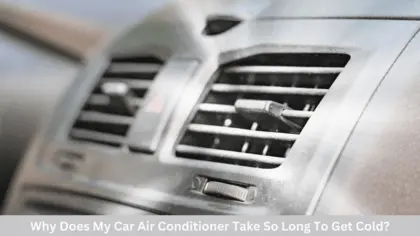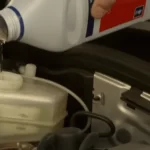Car AC Takes A While To Get Cold – Make It Cold Now!
During a car trip in the summer, the temperature starts to climb. You turn on the ac, but suddenly you notice the car is still warm and it’s delayed. Summertime sadness! What could be the reason behind Car AC Takes A While To Get Cold?
Your car needs more time to cool down if it has less fluid, has a heated engine, or if the coolant in the engine is too hot, causing the HVAC system to cool more slowly. Therefore, you have to recharge the system with freon or refrigerant.
In this article, we will look for more reasons and solutions to the car’s not cooling at the immediate time issue. Keep reading to know more about how ac functioning matters in detail.
Related Car AC: Car AC Stops Working on Highway?
How Long Does It Take For Car AC To Get Cold?

The compressor, which includes a rotary fan under the engine, generates cooling. Generally, the entire cooling system should take 5 to 10 minutes.
The interior of the automobile may still be radiating the heat that was absorbed, even though you may notice the vents are blowing cold winter air. The process of absorbing and exchanging the heat from the seats and dash may therefore take an additional ten minutes. Always turning on the air conditioner after a few miles of driving is a great choice.
See more: Subaru Outback AC compressor not turning on.
Why Does My Car Air Conditioner Take So Long To Get Cold?

Well, it’s time to share all the possible issues you face when you start the AC. Therefore, we will also look at the best repair solutions so that you won’t have to get wet even after having an air conditioner on the car.
Also Read: air conditioner only works when car is moving
Park Near The Shade
For example, you notice your Honda Civic ac takes a long time to get cold. But why? It’s because of the hot temperature outside, so you can keep the car away from the direct sun. Better yet, you park the car near any shade.
According to the Centers for Disease Control & Prevention, vehicles parked in direct sunlight can encounter interior temperatures of up to 131 to 172°F when the external temperature is almost 80 to 100°F.
Give your car’s air conditioning a boost by avoiding the development of heat. Add a windshield sun shade to keep your car from becoming an overheated automobile. Sunshades can also protect the inside of the car from harsh UV rays that lead to dashboard damage and discoloration.
Electric Issues
Another surprising source of a car ac slowdown is an accidental short circuit in the electrical unit, which usually happens due to a hot temperature. It produces a short circuit in the internal wiring if the temperature rises over 45 degrees.
However, you can employ the DIY, or do-it-yourself method by pinpointing the trouble spot, and putting in the electricity-resistant tape will solve it. However, it would be best if you called a professional or took it to a repair workshop.
AC Unit Recharge
Car A/C that doesn’t seem cool enough is typically caused by low amounts of refrigerant or freon. Freon levels should always be checked by using an AC gauge or thermometer. After that, make sure you follow the supercharging ac system.
Simply set the airflow to outdoor mode and turn the fan to its maximum performance. Once the air is hot and humid, turn on the ac unit and select the recirculation airflow setting. That’s what we usually do.
See more: how to remove freon from car without recovery machine?
Avoid Selecting Mixed Signals
How do you normally cool the inside of the car? Turn the temperature dial all the way to the coolest setting. Setting the dial in the middle will allow the car’s air conditioner to significantly reheat the air, which enhances fuel efficiency and reduces the overall performance of the air conditioner. However, maintaining the coolest setting while adjusting the fan speed is appropriate.
Switch to Regular AC Rather than Max AC
The majority of cars’ “max AC” switches only stop the clean air door and switch the HVAC system to the “recirculation” setting. It also seals the valve to the heater and lowers the heat.
Your car’s maximum A/C circulates the air, and it performs better when the internal air is cooler than the outside atmosphere. We suggest using regular ac until the car has begun to cool down. After that, turn on Max A/C to further reduce the temperature.
AC Refrigerant Leak
Refrigerant leaks are a common reason for automotive air conditioner problems, which typically result from sudden collisions. It’s quite challenging to pinpoint where the AC hose leaks from the joints. The greasy residue that develops around the hose shows refrigerant leakage. Therefore, hire a mechanic to fix it.
Faulty Compressor
The compressor is a crucial component that keeps the air conditioner running. If there’s a problem, the refrigerant won’t circulate or blow hot air when you turn on the air conditioner after being off for 2 to 3 months or in the chilly winter. However, replace it or fix it as necessary.
Faulty AC Blower
Another problem is a malfunctioning air conditioner blower that causes uncomfortable cooling in a car. However, once a particular period of six to eight months has passed, have the blower vents checked.
You can also try the do-it-yourself or DIY method, in which you have to place your palms in front of AC vents and gauge the airflow speed with your hands. If there is a problem, call a professional.
Faulty AC Actuator
Kids frequently turn on or off the AC switches while having fun while driving. Such massive pressure in the engines can cause the air flaps to open and could have an impact on the vehicle’s air conditioning system, damaging the condenser. Or perhaps the air conditioner is too old, so take it to the mechanic, though.
Related air conditioning: Subaru air conditioning intermittent?
Engine Overheating
You should know that the radiator fan will remain useless if the engine is overheated. It will not only block the condenser from cooling the car but also use the refrigerant’s maximum performance to drive hot air into the vehicle. In that case, mechanics will work best.
Damaged Compressor Belt
Compressor belts normally drive the power and energy operating in your car, but if you have trouble there, they prohibit it from starting. The air conditioner does not function properly when it is malfunctioning. You must therefore bring it to the repair shop.
Blown up Fuse
Burnt fuses, which cause the compressor to stop and release hot air, are another offender. Additionally, the circuit placed within your car might be affected by that blown fuse, which could damage the circuit board’s functioning switches. In that situation, you must either replace the ac fuse or make sure you consult a professional.
Mould & Mildew Build-up
Moreover, there is a possibility that tiny microorganisms will obstruct the AC vents. To address the mildew and mold buildup, however, it is vital to have your car serviced at least every 5 to 6 months. Restore the durability of the ac by maintaining the car.
Blocked Air Filter Cabin
The blower motor that pushes air through the car’s vents can undergo partial or complete failure due to jammed interior filters. You might need to increase the AC if your filter is obstructed. Your AC’s load increases, as does the engine’s. Remember that! Also, you might need to top off the low level of refrigerant.
Does Outside Temperature Affect the Car’s Air Conditioner?
To be honest, the warmer the outside becomes, the more problems your car’s air conditioner will have. As the outside temperature rises, your car’s complete cooling system, including the battery, fluids, belts, or hoses, is put under additional stress, and it becomes harder to keep the car cool.
When the temperature rises above 95 degrees, your air conditioner starts to operate at full capacity. The only thing you can do in this situation is run the AC at a low speed. Additionally, to run the air conditioner effectively, make sure the engine oil is at the right level and keep in mind that timing is key.
Why Doesn’t My AC Get Cold Until I Start Driving?
Actually, there isn’t enough airflow over the condenser coils, which requires using the a/c to keep the automobile cool when driving. To take heat from the refrigerant, the condenser demands airflow.
You’ll notice that condenser fan operation ensures outstanding a/c performance. The car air conditioner can also be distracted by a clogged condenser, worn-out condenser components, low freon levels, and compressor issues. As a result, your car’s air conditioning system works effectively when you start the car.
See more: car struggles to start but runs fine.
How Often Should You Recharge Your Car’s AC?
You might notice your car’s air conditioner is blowing warm or hot air rather than cold air, the A/C clutch is not engaging, or a weird type of smell comes out from your vents, indicating you need to recharge the battery.
Additionally, with time, the refrigerant gas that powers the system will start to leak outside of it. Anyway, every 1–3 years, you must recharge your car’s air conditioning.
FAQ
How do I know if my car’s AC compressor is bad?
One can identify a faulty air conditioning compressor by observing a high cabin temperature, fluid leaks, strange noises, or a stuck clutch. However, if the AC clutch and pulley bearing are in good condition, you can drive a car with a u003ca href=u0022https://madisonrising.com/can-i-drive-my-car-with-a-bad-ac-compressor/u0022u003eu003cstrongu003edefective AC compressoru003c/strongu003eu003c/au003e while the AC is off.
How do I know if my AC condenser is clogged?
1. The clogged condenser will automatically shut off.u003cbru003e2. A compressor freeze is a sign that there isn’t enough Freon or that the lubricant is unclean and has clogged the compressor.u003cbru003e3. Produce compressor noise.u003cbru003e4. Another possibility is discontinuous cooling.u003cbru003e5. Or perhaps the car is jammed by the gauge issue.
Is it worth replacing the compressor on the AC unit in the car?
Yes, it makes sense to replace your car’s air conditioning system after some time. Otherwise, the device can overheat and damage other components.
Car ac not cold enough, is it the refrigerant that needs refilling?
It typically occurs when the car demands recharging of the refrigerant. Additionally, you can examine the filter that needs airflow, or an evaporated core could be the cause of a delay in the ac system’s ability to keep the car cold.
Concluding Part
Anyway, we have understood we usually face faulty parts, engine issues, blockages on the filter, maybe some damaging issues, or the air conditioner not getting cold due to weather conditions. So, car AC takes a while to get cold, right? Is there any difficulty left? We guess, no.
Now, you can see the problem just by giving a glance at this article, and we have the solutions as well. Follow our given steps or see a professional mechanic to fix the car.






